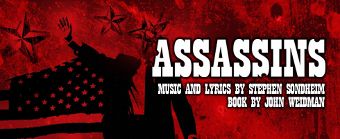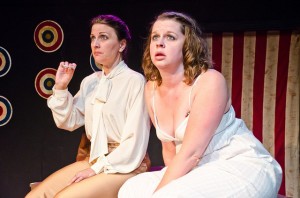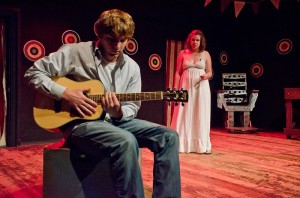THE TRUE AMERICAN DREAM: KILL A PRESIDENT
The cast is terrific in the Coeurage Theatre Company’s revival of Assassins at the Actors Circle Theatre’”and it is their commitment to the material that highlights both the strengths and weaknesses in this rarely performed Stephen Sondheim/John Weidman musical. The strengths include sharp characters and fabulous songs; the weaknesses are a lack of narrative surprise and the inability of the material to offer many true insights into the minds of those who dream of killing a president.
The premise is simple: Each of nine people who have tried to kill or who actually have killed an American president is given a chance to persuade us of his or her higher purpose. It is an entertainment’”in the bygone sense of revues and follies built around specialty acts’”and a state fair/carnival atmosphere prevails.
The Balladeer (Jeremy Lelliott) serves as a narrator; The Proprietor (Aimee Karlin), a quasi-narrator, is the arms dealer for the assassins, some of whom are gung ho from the get go, and some of whom require a bit of encouragement to finally put a finger on the trigger.
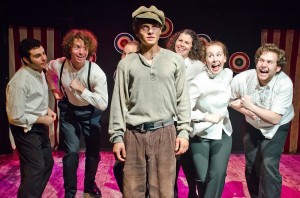 The unsuccessful assassins are Giuseppe Zangara (F.D.R.), Lynette “Squeaky” Fromme and Sara Jane Moore (Ford), John Hinckley, Jr. (Reagan), and Samuel Byck (Nixon). The assassins who find their marks are Charles Guiteau (Garfield), Leon Czolgosz (McKinley), and of course the big ones: John Wilkes Booth (Lincoln) and Lee Harvey Oswald (Kennedy), both of whom enter into an unholy metaphysical alliance late in the second act that allows these past, present, and future assassins to fully realize and embrace the right to their dreams as well as to have some sunshine, “Well, maybe not the sun, but one of its beams.”
The unsuccessful assassins are Giuseppe Zangara (F.D.R.), Lynette “Squeaky” Fromme and Sara Jane Moore (Ford), John Hinckley, Jr. (Reagan), and Samuel Byck (Nixon). The assassins who find their marks are Charles Guiteau (Garfield), Leon Czolgosz (McKinley), and of course the big ones: John Wilkes Booth (Lincoln) and Lee Harvey Oswald (Kennedy), both of whom enter into an unholy metaphysical alliance late in the second act that allows these past, present, and future assassins to fully realize and embrace the right to their dreams as well as to have some sunshine, “Well, maybe not the sun, but one of its beams.”
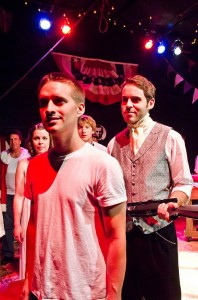 Kim Reed and Nicole Monet as Moore and Fromme are especially fun. Moore is all thumbs, accidentally shooting her dog as she fumbles with her gun, showing up at the assassination site with her son in the car’”she forgot that school was out that day’”and never fully articulating to herself what drives her to want to kill Gerald Ford. Reed is spot on, from addled physicality and nervous sadness to her rare moments of stillness when she gets flickers of self-knowledge; her own smallness is impossible for her to accept. Monet plays Fromme as perhaps a more conventional loony-toon, but she is chillingly straightforward when she sings the intentionally banal pop ballad duo ”Unworthy Of Your Love,” in which Fromme, serenading Charles Manson, sings alongside a sweet-voiced Jesse Bradley as John Hinkley, who sings to Jodie Foster. (For the record, in real life Moore and Fromme did not work together’”their attempts on Ford’s life were seventeen days apart’”and Moore did not bring her son, though she was worried about picking him up from school on time afterwards. I was unable to find any information about her dog.)
Kim Reed and Nicole Monet as Moore and Fromme are especially fun. Moore is all thumbs, accidentally shooting her dog as she fumbles with her gun, showing up at the assassination site with her son in the car’”she forgot that school was out that day’”and never fully articulating to herself what drives her to want to kill Gerald Ford. Reed is spot on, from addled physicality and nervous sadness to her rare moments of stillness when she gets flickers of self-knowledge; her own smallness is impossible for her to accept. Monet plays Fromme as perhaps a more conventional loony-toon, but she is chillingly straightforward when she sings the intentionally banal pop ballad duo ”Unworthy Of Your Love,” in which Fromme, serenading Charles Manson, sings alongside a sweet-voiced Jesse Bradley as John Hinkley, who sings to Jodie Foster. (For the record, in real life Moore and Fromme did not work together’”their attempts on Ford’s life were seventeen days apart’”and Moore did not bring her son, though she was worried about picking him up from school on time afterwards. I was unable to find any information about her dog.)
As Czolgosz, McKinley’s assassin, Jonas Barranca is riveting. He gives this penniless Polish immigrant a true sense of isolated desperation that, along with his turbulence and hero worship of socialist icon Emma Goldman, seems perhaps the most reasonable of all the assassins’ motivations. Barranca’s Polish accent is believable, his powerful body seems like that of a real laborer rather than a gym rat, and his singing is first rate.
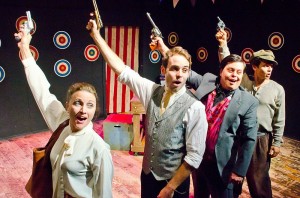 Actually the singing is first rate across the board, which is hard to manage with a score this tricky. Director Julianne Donelle has chosen her cast with evident care and imagination. They are different shapes and sizes, which is not always the case with productions in image-conscious Los Angeles, where even the nebbishes often sport six-packs. These actors approach their characters with specificity of purpose, and all within their abilities: No one tortures a theater song into a power ballad, overacts, or bites off more than he or she can chew’”though in an otherwise effective portrayal of Guiteau, President Garfield’s delusional assassin, Nick Rocz verges on the Grand Guignol as his hanging approaches, and could rein it in a little.
Actually the singing is first rate across the board, which is hard to manage with a score this tricky. Director Julianne Donelle has chosen her cast with evident care and imagination. They are different shapes and sizes, which is not always the case with productions in image-conscious Los Angeles, where even the nebbishes often sport six-packs. These actors approach their characters with specificity of purpose, and all within their abilities: No one tortures a theater song into a power ballad, overacts, or bites off more than he or she can chew’”though in an otherwise effective portrayal of Guiteau, President Garfield’s delusional assassin, Nick Rocz verges on the Grand Guignol as his hanging approaches, and could rein it in a little.
Ryan Wagner is effective as Booth, the lynchpin of the group, but I do wish he had more natural charisma. He is overshadowed in his scenes with Lee Harvey Oswald (Jeremy Lilliott, who also plays the Balladeer). Lilliott is short and wiry, but his eyes dare you to look away, and his energy dominates when Wagner should seem to be the manipulator.
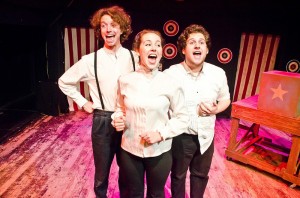 While performances of the principals are all successful to varying degrees, there are a couple of very rocky moments in the ensemble, where some of the more over-eager actors try to call too much attention to themselves’”especially a dreadfully conceived and executed homage to Michael McDonald’s creepy kid from MadTV that stops the show in the worst possible way’”he is meant to be Sara Jane Moore’s annoying son, but that odd choice takes us right out of the piece. And note to would-be tattoo recipients: It’s highly unlikely that historical characters such as Emma Goldman sported ink on their wrists.
While performances of the principals are all successful to varying degrees, there are a couple of very rocky moments in the ensemble, where some of the more over-eager actors try to call too much attention to themselves’”especially a dreadfully conceived and executed homage to Michael McDonald’s creepy kid from MadTV that stops the show in the worst possible way’”he is meant to be Sara Jane Moore’s annoying son, but that odd choice takes us right out of the piece. And note to would-be tattoo recipients: It’s highly unlikely that historical characters such as Emma Goldman sported ink on their wrists.
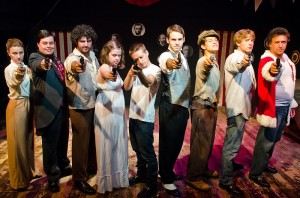 Save for an unfortunately modern and unflattering leggings and jacket outfit on the Proprietor, Kara McLeod does a nice job with the costumes. The downtrodden and unwashed seem appropriately so. I do wish the ensemble members stepping in occasionally for various presidents might have been allowed to cast off their rags for something more dignified’”though that is likely a directorial rather than design choice. Other technical credits are good enough for a small space and a limited budget, but do not offer up anything wildly imaginative, while the limited band under the musical direction of Gregory Nabours is occasionally a bit tinny and out of tempo with the singers.
Save for an unfortunately modern and unflattering leggings and jacket outfit on the Proprietor, Kara McLeod does a nice job with the costumes. The downtrodden and unwashed seem appropriately so. I do wish the ensemble members stepping in occasionally for various presidents might have been allowed to cast off their rags for something more dignified’”though that is likely a directorial rather than design choice. Other technical credits are good enough for a small space and a limited budget, but do not offer up anything wildly imaginative, while the limited band under the musical direction of Gregory Nabours is occasionally a bit tinny and out of tempo with the singers.
Assassins is a show that for me never quite overcomes its basic shallowness. Its glib observations about fame and the vacuity of the American dream are not new, nor are they particularly revelatory. But it’s a clever puzzle from the minds of two master puzzlers, Sondheim and Weidman, and it never fails to amuse with its own jaundiced self-satisfaction.
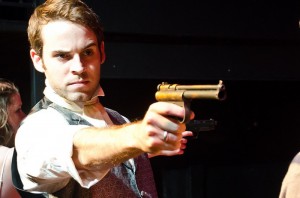 It’s a testament to the talents of all involved in this production that the experience was so positive, considering the distractions: The air conditioning wasn’t working properly and people were fanning themselves with their programs; someone brought a noisy toddler who was apparently disinterested in American history; the people sitting near us were loudly drunk; someone’s mobile phone went off loudly and long; the chairs at the Actors Circle are a hellish combination of hard church pew backs and ancient, sagging theater seats; and, a woman brought a salad in with her that we were convinced she was about to loudly eat during the performance. Tip of the hat to her: she didn’t. If she had, there might have been a tenth assassin to sing about last night.
It’s a testament to the talents of all involved in this production that the experience was so positive, considering the distractions: The air conditioning wasn’t working properly and people were fanning themselves with their programs; someone brought a noisy toddler who was apparently disinterested in American history; the people sitting near us were loudly drunk; someone’s mobile phone went off loudly and long; the chairs at the Actors Circle are a hellish combination of hard church pew backs and ancient, sagging theater seats; and, a woman brought a salad in with her that we were convinced she was about to loudly eat during the performance. Tip of the hat to her: she didn’t. If she had, there might have been a tenth assassin to sing about last night.
photos by Kevin McShane
Assassins
Coeurage Theatre Company
Actors Circle Theatre
ends on September 9, 2012
for tickets, visit Coeurage Theatre
